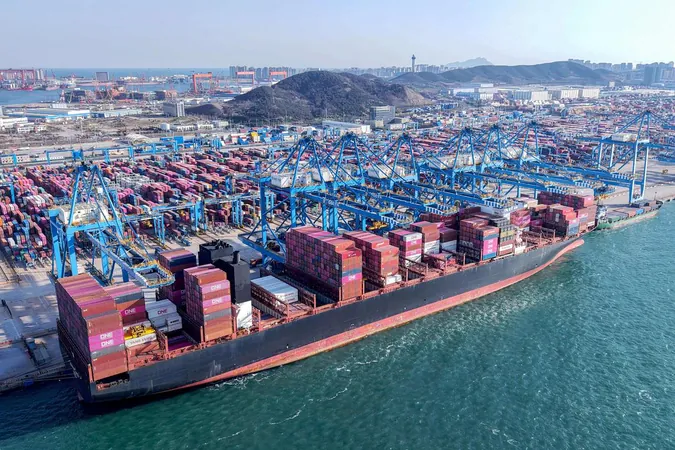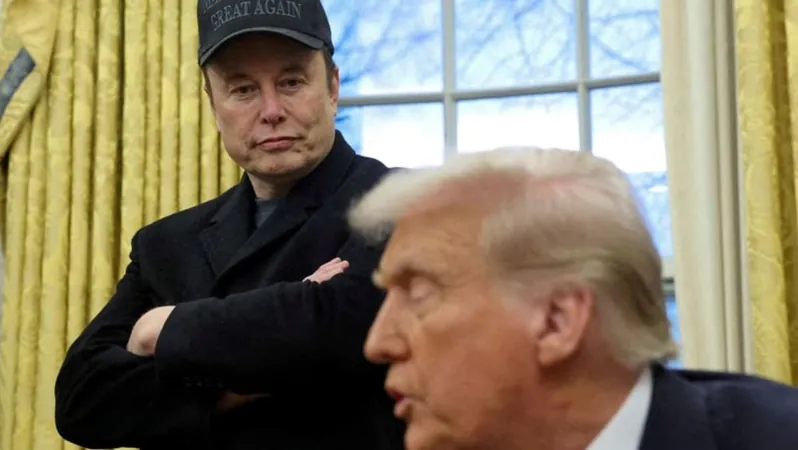
China Strikes Back: The Global Trade War Escalates with New Tariffs on U.S. Goods
2025-04-04
Author: Wei Ling
In a dramatic escalation of the ongoing trade war with the United States, China has levied additional tariffs of 34% on American imports as of April 4. This aggressive maneuver, coinciding with U.S. President Donald Trump’s historic tariff increases, has sowed the seeds of recession fears and ignited a tumultuous downturn in global stock markets.
As the two largest economies in the world find themselves locked in a strategic standoff, Beijing has taken further action by restricting exports of critical rare earth minerals, essential for various high-tech industries. Additionally, China has filed a formal complaint with the World Trade Organization (WTO), highlighting its discontentment with U.S. trade practices.
China's trade actions also included a notable expansion of its "unreliable entity" list, which now encompasses 11 foreign companies, targeting those linked to military supplies for Taiwan—a region that China considers part of its territory. This list is significant as it gives Beijing the leverage to impose punitive measures against foreign entities that it perceives as threats.
The ripple effects of this economic spat are being felt globally. Countries from Canada to Japan are preparing retaliatory measures in response to Trump's elevated tariffs, which have climbed to the highest levels seen in over a century. Investment giant JP Morgan has raised its forecast, now predicting a 60% chance of a global recession by the end of the year, up from an earlier estimate of 40%.
In the wake of these developments, U.S. stock futures plummeted following China's tariff announcement, which came just a day after new levies wiped off a staggering $2.4 trillion from U.S. equities. “China comes out swinging with an aggressive response to Trump’s tariffs,” noted market strategy expert Stephane Ekolo. “The market’s negative reaction suggests investors are bracing for a potentially prolonged trade conflict.”
Big Tech firms, including Apple and Nvidia, which heavily rely on Chinese manufacturing, faced significant declines in pre-market trading. Japan's Prime Minister Shigeru Ishiba voiced alarm, declaring the tariffs a “national crisis,” particularly as Tokyo's banking shares suffered drastically on April 4, pointing to the possibility of the country facing its worst economic week in years.
Contrasting the growing concerns, U.S. Secretary of State Marco Rubio dismissed fears of an economic downturn, asserting the markets are simply adjusting to a new global trade order. Meanwhile, the European Union, facing its own challenges, expressed a commitment to engage with the U.S. for a mutual solution, though divisions exist among EU member states on the approach to take against Trump’s tariffs.
French President Emmanuel Macron has called for a freeze on U.S. investments, while conflicting comments from U.S. officials suggest uncertainty over whether the tariffs will be a long-term fixture or a negotiation tactic. Some economists warn that proposed tariffs could lead to higher prices on a wide array of consumer goods, including electronics like iPhones, which could see prices spike to as high as $2,300 under the proposed tariffs.
Businesses across sectors are scrambling to adapt, with carmaker Stellantis announcing temporary layoffs in the U.S. and closures at Canadian and Mexican plants, while General Motors is ramping up production within the United States.
China’s countermeasures aim to respond to the unprecedented 54% tariffs imposed on its goods by the U.S. At the same time, the EU faces a potential 20% duty on its exports. Other trading partners such as Japan, South Korea, and India are cautiously observing the situation, opting to postpone retaliation while they explore potential concessions.
With escalating tensions and a multitude of conflicting strategies, the international community watches closely as this high-stakes trade war unfolds, raising questions about how it will reshape global economic relationships and provoke shifts in market dynamics around the world.





 Brasil (PT)
Brasil (PT)
 Canada (EN)
Canada (EN)
 Chile (ES)
Chile (ES)
 Česko (CS)
Česko (CS)
 대한민국 (KO)
대한민국 (KO)
 España (ES)
España (ES)
 France (FR)
France (FR)
 Hong Kong (EN)
Hong Kong (EN)
 Italia (IT)
Italia (IT)
 日本 (JA)
日本 (JA)
 Magyarország (HU)
Magyarország (HU)
 Norge (NO)
Norge (NO)
 Polska (PL)
Polska (PL)
 Schweiz (DE)
Schweiz (DE)
 Singapore (EN)
Singapore (EN)
 Sverige (SV)
Sverige (SV)
 Suomi (FI)
Suomi (FI)
 Türkiye (TR)
Türkiye (TR)
 الإمارات العربية المتحدة (AR)
الإمارات العربية المتحدة (AR)